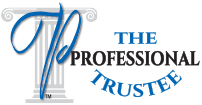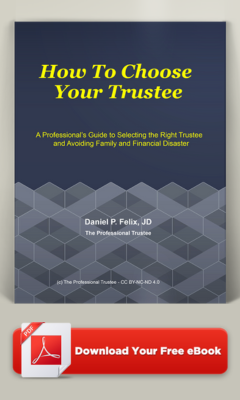Don’t Wait Until It Is Too Late
One of the prevalent and cruel myths in the trustscape is that the successor trustee has nothing to do until the disability or death of his predecessor.
At first glance, this wrong idea makes some sense. After all, it reflects the legal reality: typically the successor has no fiduciary or legal duty until it’s time to formally step in.
And this wrong idea also embraces a surface practical reality: Predecessor trustees are often the grantors, and are doing just fine! Just ask them. These grantors are confident that they know what they’re doing, having been managing well for years, and don’t think they need to start trading away their independence or spending their valuable time and money with their successors— thank you very much!
If that’s not enough, this wrong idea also relies on the related myth that everything the successor needs to know is contained within the four corners of the trust documents. When it’s time, they believe those papers will provide all the answers.
The flaw in this myth is revealed in the pursuit of two critical goals which prove that the trust documents are just a start.
We want to set the family up for success and to have them suffer the least pain additional to their inevitable raw feelings over the loss of the grantor. We want the successor to act promptly and efficiently when the time comes. These goals cannot be met if preparedness stops with signing the trust document.
For many of us, at the end of our day, these goals are what we truly want. As our ultimate priority, our attention goes to how we can best accomplish them. These goals can be accomplished best by advance work with the successor trustee, because the truism applies that the ounce of prevention avoids pounds of cure.
And so, it should not be surprising: the failure to pursue these worthwhile goals and the failure to involve the successor trustee in advance costs families both money and peace of mind, and too often, their future harmony as well.
Here’s a list of 12 of the many breakdowns I’ve encountered. All of them could have been avoided— or at least mitigated— by getting the successor involved sooner than later.
The successor isn’t clear on what to do. There’s a cartoon of an anxious restaurant manager reading a multi-page instruction book for handling a fire while engulfed in flames that are burning down the restaurant. It illustrates well what I see with distressing regularity in families faced with trust administration: the time of crisis is the worst time for the successor to learn about the intricate technical and people-management demands of the job. Make sure your successor knows what needs to be done and has the time and skill to do it.
The grantor has ignored his team. That same trust document may need to be tweaked after review with the rest of the family and your successor. Their reasonable questions and issues may surprise you. And certainly tweaking is necessary because of the changes that inevitably come with time. Review your trust documents with your successor and your family — perhaps even once a year.
The family doesn’t know what to expect from the successor. Just because you’re good with your successor, doesn’t mean that your family is. The more familiar they are with your successor and what’s going to happen next, then the more comfort they will enjoy while traveling through this difficult passage. Your family shouldn’t meet your successor for the first time at your funeral.
The grantor doesn’t understand the process. Intergenerational transition at its best involves clarity, consensus, competence and compassion. These aren’t achieved by a one-time preparation of documents. As essential as those documents are, they are not enough to accomplish the goals of family harmony and cost efficiency. A trust is a process as well as a document. Get your successor involved in the process.
The successor doesn’t know where everything is or who’s who. Your successor steps into your shoes with both your family and your advisor relationships and also with all your accounts, holdings, online presences and property. Too many widows spend the first 90 days after they lose their spouse just looking for stuff. Also, advisor relationships work best with a pre-existing personal and professional connection. Key preparedness deliverables include an inventory of property as well as a well-used contact list of stakeholders and advisors. Make your successor familiar with your assets and your team.
The grantor is in denial about his health needs. One of the successor trustee’s key collaborators is the health care manager/advocate. Having the grantor and the grantor’s family comfortable and already working with this health professional can make a huge difference when disability or other sickness interferes with daily activities. Have your health team coordinate with your successor trustee. Remember: the successor’s primary job may be paying for various health needs and wants of an invalid beneficiary — who may be you!
Denying your successor the gift of practice. Do you want the maiden voyage of your trust to also be its first test flight? And at a time when you’re not available to make any necessary tweaks or changes? Better to have some stress-testing in advance to make sure it will fly, and that everyone’s on board. Practice with your successor.
The grantor can’t give direction on everything. Our lives often change rapidly. In exercising discretion in unforeseen situations, your successor’s understanding of your values and aspirations is helpful and sometimes critical. Share your values and concerns with your successor. There are many good surveys and programs for sharing your values and goals. My own one-page survey is available on request.
The successor doesn’t understand your trust. The booklet that is your trust document contains your critical directions. It is not written in plain English, but in the foreign and difficult language of legalese. Many of us cannot read a trust document without the help of an estate lawyer. Make sure you, your family and your successor are on the same page, with a translation of your trust into a short simple memo to outline who does what and when. The trust guide memo is one of our core and most popular deliverables. Warning: your estate lawyer may not like it!
Failing to warn your successor about your dirty laundry. Some grantors treat their successor like their hired hit man. You may, for example, plan to disinherit a family member and can’t bring yourself to inform that person in advance. So you leave both the disinheriting and the informing of it to your successor. If that’s your plan, at least warn your successor about the unpleasant tasks ahead. Your successor may require combat pay — or may refuse the contract entirely. After all, leaving surprise messes will likely make for bigger family upset and could lead to lawsuits.
Leaving your successor unprepared. This is especially true of difficult tasks. For one example: You direct your successor trustee to impose a budget on your surviving spouse or descendent. The next questions are: are they on a budget now? Why is your successor in a better position than you are to get that or other similar jobs done? Work with your successor to establish a program in advance, such as enhancing budgeting skills with the help of your investment team and daily money manager.
Your successor decides not to step in. It’s not apocryphal. When the time comes for them to go from successor to active trustee, some banks refuse to serve because of some language in the trust or because of the amount or type of trust assets. And some individuals don’t want the headache either. At this time of need is the worst time to find out that there’s no successor. Make sure your successor trustee is comfortable with the powers and the constraints of the trust document — and is committed to serve.
These are lessons drawn from real-life situations. How to apply them to your own situation is an individual matter. Each person and every family is different and will face their own unique constellation of issues with their own process for moving forward.
Bottom line: to pursue the goal of a financially and emotionally successful transition, involve your successor trustee now.
Don’t wait until it’s too late.
© 2008 – 2024 Daniel P. Felix, all rights reserved.


